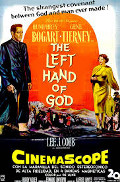
Directed by
Edward Dmytryk
87 minutes
Rated PG
Reviewed by
Bernard Hemingway

The Left Hand Of God
The fact that Lee J. Cobb, complete with broad America accent, plays a Chinese warlord, typifies the dated attitudes of this film, an adaptation of a book by William E. Barrett.
Humphrey Bogart plays Father O’Shea, a missionary priest in China in 1947, a time of growing civil unrest prior to the Communist take-over. He turns up, ostensibly to take over from the recently-deceased incumbent, in a small, remote mission headed by husband and wife team, Beryl (Agnes Moorehead) and Dr. David Sigman (E.G. Marshall). Whilst Beryl immediately senses that he is too worldly to be a priest, the beautiful, love-lorn mission nurse, Anne Scott (Gene Tierney) rapidly falls for his sad eyes and alpha-male aura. Sure enough, we find out that the pistol packing padre is in fact a crashed fighter pilot-turned-mercenary, James Carmody, on the run from Cobb’s aforementioned warlord for whom he has been working since being plucked from his plane's wreckage years earlier.
The dated “Americentric” values aside, the film benefits from the solid performances by the four main players whilst the central premise of Bogart’s religious and moral conversion, if not entirely successfully brought out, is an interesting one. Thus, it seems that the extent of the compliance of Bogart’s Carmody with the Church hierarchy is more a function of the ideological norms of the time than the plausible response of the character who is perhaps too imbued with Bogey’s laconic screen persona to be believable as a “born again” Christian. Nevertheless the film is quite enjoyable and, if nothing else, is far from being the worst of the many forays of Hollywood into the Asian region during this period.
Want something different?





